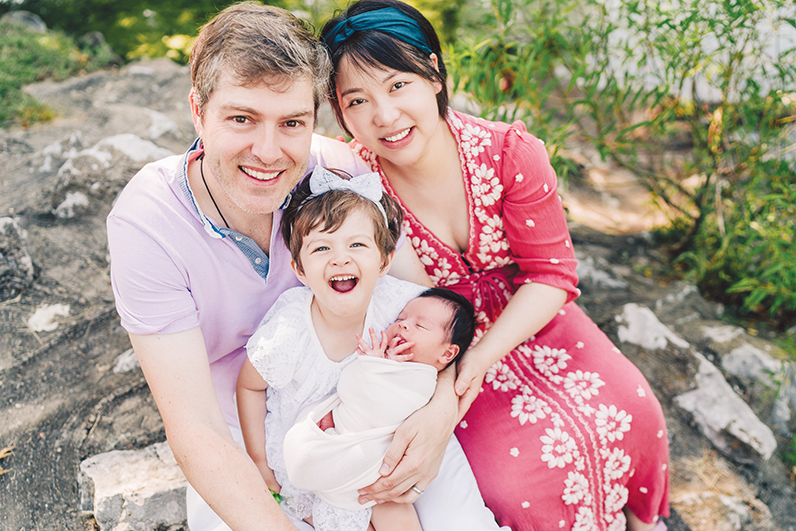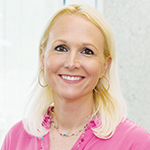 Mercy researcher Jiajing Chen, pictured with her husband, Andy Greenwood, and children, lost her battle with cancer last year.
Mercy researcher Jiajing Chen, pictured with her husband, Andy Greenwood, and children, lost her battle with cancer last year.
A researcher at Chesterfield, Missouri-based Mercy who helped develop an AI-driven program to serve at-risk chemotherapy patients received her own cancer diagnosis while working on the project.
Jiajing Chen, the biostatistician assigned to the topic, had peripheral T-cell lymphoma. She died last year. After her death, the platform was named in her honor.
 Carlson
Carlson"She was so instrumental that it never would have happened without her," Dr. Jay Carlson, Mercy Cancer Care Performance Acceleration medical director, said of the Chen Chemotherapy Model.
Chen had a Ph.D. in health outcomes research and a master's degree in biostatistics and epidemiology, both from Saint Louis University.
Andy Greenwood, Chen's husband, said she wanted to be a doctor from a young age and completed three years of medical school in China before her family moved to the U.S. She didn't want to start medical school over again in the states, but still had a
love for medicine and public health. That led her to her public health career. "I think she found her talents were best utilized there," Greenwood said.
"She had such a keen attention to detail and also she never took shortcuts or would sacrifice anything in terms of the work that she did," he added.
In August 2020, Chen's project won an Innovation of the Year award at the Association of Community Cancer Centers National Oncology Conference for the original algorithm version of the Chen Chemotherapy Model. The model was recently updated to include
the smart text program.
Identifying risks
Earlier that year, the Centers for Medicare & Medicaid Services had announced its outpatient quality initiative called OP-35. The initiative involved monitoring inpatients and outpatients within 30 days of chemotherapy
treatment, said Carlson. The initiative focused on nonleukemia chemotherapy patients 18 years and older.
Using 12 years of medical record data, Chen and Carlson reviewed 42,000 "chemo encounters." From that information, they developed an algorithm that predicted who is at risk for an emergency room visit after chemotherapy.
 A platform created as part of the Chen Chemotherapy Model developed by Jiajing Chen and colleagues at Mercy sends questions to chemotherapy patients after treatments via text. Their answers help care providers determine how to manage their treatment.
A platform created as part of the Chen Chemotherapy Model developed by Jiajing Chen and colleagues at Mercy sends questions to chemotherapy patients after treatments via text. Their answers help care providers determine how to manage their treatment.Through their research, they identified 18 risk factors that could be associated with an ER visit or inpatient admission, said Carlson, who is also medical director of the oncology service line at Mercy.
In the project's next phase, Carlson and Chen focused on the reasons chemotherapy patients visit the ER that could be managed in an outpatient setting. That's when they developed the smart text platform.
Patients who opt into the platform receive a daily text for seven days after undergoing chemotherapy, except weekends and holidays. The text includes a list of symptoms including diarrhea, pain, fever, fatigue, nausea/vomiting or no symptoms. When patients
select a symptom, they are prompted to rate it.
Symptoms deemed severe based on internal criteria in the platform are escalated to the patient's triage team, Carlson said. Nurses then conduct a further assessment and determine if there's an opportunity to proactively manage the patient.
The model, according to Carlson, has increased the standard of care. Previously, Mercy care providers wouldn't know if a patient had a problem until the patient called his or her provider or was in the ER.
"Patients have found it very easy to answer the text," Carlson said. "Clinics found it to be a very positive option. They're able to prioritize their day and affect that patient journey in a positive way."
AI assistance
The Chen Chemotherapy Model is one of several AI-related products Mercy's team has developed to assist providers, according to Kerry Bommarito, Mercy vice president of enterprise data science. The intent of AI in a
medical setting is to assist patients, she said, "not to be the one thing that makes the decision or determines any sort of treatment or care."
 Bommarito
BommaritoThe texting platform is "enabling patients to respond to questions about their symptoms in the easiest way possible," Bommarito said. "It's not intrusive."
Bommarito said that after Chen's diagnosis, the chemotherapy model project became "so much more real" to her.
"It was really important to her that once she returned from her medical leave she still had that opportunity to work on it," Bommarito said. "And after she had passed, it was important to us that we name it after her, because of how important it was to
her."
Chen, with her data science and statistics research background, "really dug into the data" and determined which factors were important, Bommarito said.
Mercy does not plan to market the algorithm, but it does plan to submit the concept and the related workflow for publication in a medical journal so other health systems could potentially make use of a similar analysis within their electronic
medical record.
Power of mission
For Greenwood, it's gratifying that the work Chen was involved with will make a difference and save lives.
"That makes me very proud as her husband, to know I married someone very brilliant," he said. "It kind of warms my heart to see that come to fruition."
In addition to her intellect, Greenwood said Chen was a warm person with a happy spirit.
"She loved being around family and friends, helping others and brought great joy, really," he said. "The thing that was said over and over again at her funeral is that people remember her for her smile. Her smile really did give people a glimpse into
who she was and into that spirit."
Greenwood said his wife fought her illness "with every inch of strength" she had, but the cancer proved very aggressive. "Every day counts, and it was hard for me just to watch someone go through that much suffering," he said.
Having the model being named after Chen is special for her children, aged 1 and 4, according to Greenwood.
"It gives me something to share with them as they get older," he said. "Our daughter was in the hospital a lot visiting. She saw everything unfold. So she will carry those memories, I think, forever. And knowing that (my wife) was trying to help cancer
patients will, in some ways, potentially help with our personal healing journey through time."
Chen loved serving others.
"She really felt that power of mission at Mercy through her journey and even now," Greenwood said. "It's incredibly meaningful to us that Mercy and the Catholic communities here have been so supportive of us and our families."